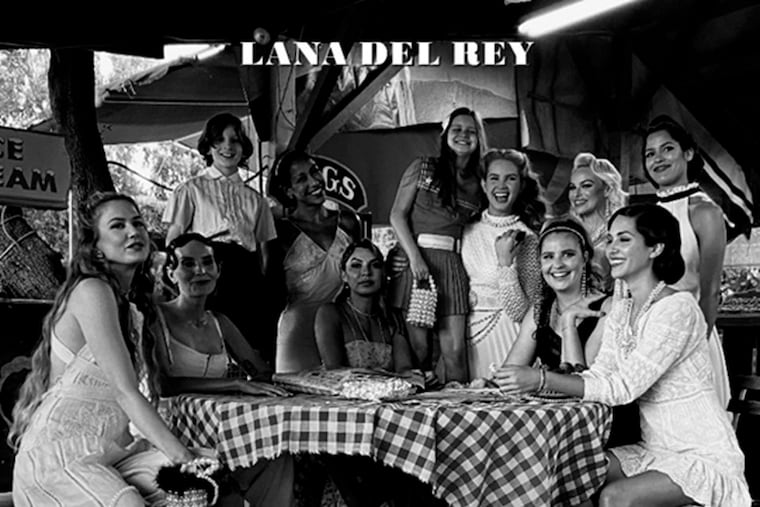Lana Del Rey’s seventh album considers cost of fame; plus Harmony Woods, the Antlers
New music releases include Lana Del Ray's "Chemtrails Over the Country Club."

Lana Del Rey
Chemtrails Over the Country Club
(Interscope / Polydor ***)
Lana Del Rey hits the road looking for America on Chemtrails Over the Country Club.
It’s been an ongoing pursuit, going back to “Video Games,” the 2010 single in which the former Lizzy Grant first introduced herself as a siren of sun-kissed California noir in the shadow of the Hollywood sign.
Recognition of Del Rey’s stature as an auteur was unjustly slow, but with the release of 2019′s Norman F— Rockwell, the critical establishment got the memo and declared LDR to be a Great American Songwriter.
Her seventh album is by no means a makeover, but it does subtly shift Del Rey’s languorous sound. She sings more in a breathy upper register and leans into country and folk, particularly on “Breaking up Slowly,” a duet with Nashville singer Nikki Lane, which rhymes “life of regret” with “Tammy Wynette.”
Del Rey has been embroiled in multiple controversies of late, from Instagram comments critical of other female artists to scrutiny over the diversity of the crowd on the Chemtrails cover. Perhaps as a result, the album considers the cost of fame, and the singer often sounds as if she’d has enough.
The opener, “White Dress,” conjures her innocent, 19-year-old self, “listening to the White Stripes when they were white-hot.” The song invokes Philadelphia jazzman Sun Ra as an interstellar escape artist, and makes a good joke about entertainment industry misogyny, recalling a make-believe Men in Music Business Conference.
On “Let Me Love You Like a Woman,” Del Rey declares she’s “ready to leave L.A.,” and much of Chemtrails tests out alternative locales for her seductive, subtly arresting songs. “Tulsa Jesus Freak” suggests “we should go back to Arkansas, trade this body for a can of gin.” And “Yosemite” idealizes a national park getaway that appeals because it stops time in its tracks: “Isn’t it cool how nothing here changes at all?”
— Dan DeLuca
The Antlers
Green to Gold
(Anti-, ***1/2)
On Green to Gold, the Antlers open up by paring back. Now a duo of multi-instrumentalist and vocalist Peter Silberman and drummer Michael Lerner, the band has shifted from the high drama, emotional trauma and extreme dynamic shifts that defined Hospice, their 2009 breakthrough concept album that became an indie-rock touchstone (and garnered Arcade Fire comparisons).
For their first album in seven years and first since the departure of keyboardist / horn player Darby Cicci, the Antlers choose a pastoral, placid palette: gentle guitars, piano, and brushed drums, judiciously accented with woodwinds or strings on a few tracks. Whereas their first five albums strove for catharsis through crashing climaxes, Green to Gold is more tempered but no less rewarding. The toning-down may in part be a result of Silberman’s health issues (bouts of vocal cord and hearing impairments) and his relocation from bustling Brooklyn to bucolic upstate New York. The lyrics often use nature as a metaphor for rejuvenation or for seeking connection, as on “Volunteers” which on the literal level is about plants.
The highlight throughout is Silberman’s flexible, expressive falsetto, which can call to mind Bon Iver’s Justin Vernon or Shearwater’s Jonathan Meiburg. It’s a thing of beauty, and songs such as “Solstice,” “Wheels Roll Home” and, especially, the title track are striking in their easy confidence and soothing, flowing melodies.
In the past, Antlers’ songs exploded; on the incandescent Green to Gold, they burn slowly, but brightly.
— Steve Klinge
Harmony Woods
Graceful Rage
(Skeletal Lightning ***)
Earlier this month, Philadelphia-based singer/songwriter Sofia Verbilla surprised her fandom with the latest Harmony Woods album.
Graceful Rage, Harmony Woods’ third full-length, is a cathartic confessional written by Verbilla for Verbilla that brings listeners along for her personal journeys of confrontation, reflection, and relief.
“I told you I wanted to kill myself / You took that as meaning something else,” she sings in the title track. “A clever way to get you to stay / A toxic maneuver to quell my heartbreak.”
While Verbilla touches on themes of processing trauma and addressing abuse, she also tells more direct stories, like in “Rittenhouse,” where she sings about facing an unplanned pregnancy.
Verbilla gives a standout performance in “God’s Gift to Women,” a song about standing up to a misogynist in the music industry. The punchy track deviates from the dark dense mood of the rest of the album and provides a fistful of pop-punk.
“But I’m done playing along / Not singing along anymore,” Verbilla sings. “Cause you’re not the person / The world pretends you are.”
The album is strongest when Verbilla belts gut-wrenching lyrics over dramatic instrumental crescendos that flood listeners with heavy bass and percussion and adds complementing horns, strings and/or keys, elevating her raw powerful emotion.
“I should be mad at you / For what you did / I’m mostly sad for you instead,” she sings. “But if you ever lay a finger / On another girl again / You’ll be dead to me / You make it so easy.”
Graceful Rage affirms that Verbilla is strong, eloquent, talented, and can move people with her dynamic and consuming music.
— Kristen Balderas